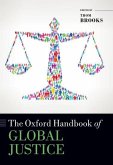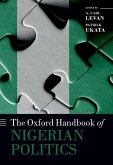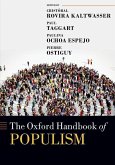The Oxford Handbook of International Security
Herausgeber: Gheciu, Alexandra; Wohlforth, William C
The Oxford Handbook of International Security
Herausgeber: Gheciu, Alexandra; Wohlforth, William C
- Broschiertes Buch
- Merkliste
- Auf die Merkliste
- Bewerten Bewerten
- Teilen
- Produkt teilen
- Produkterinnerung
- Produkterinnerung
The essential volume for all those working on International Security and related areas.
Andere Kunden interessierten sich auch für
![The Oxford Handbook of International Political Theory The Oxford Handbook of International Political Theory]() The Oxford Handbook of International Political Theory62,99 €
The Oxford Handbook of International Political Theory62,99 €![The Oxford Handbook of Global Justice The Oxford Handbook of Global Justice]() Thom BrooksThe Oxford Handbook of Global Justice60,99 €
Thom BrooksThe Oxford Handbook of Global Justice60,99 €![The Oxford Handbook of Nigerian Politics The Oxford Handbook of Nigerian Politics]() The Oxford Handbook of Nigerian Politics71,99 €
The Oxford Handbook of Nigerian Politics71,99 €![Oxford Handbook of Water Politics and Policy Oxford Handbook of Water Politics and Policy]() Oxford Handbook of Water Politics and Policy69,99 €
Oxford Handbook of Water Politics and Policy69,99 €![Oxford Handbook of Environmental Political Theory Oxford Handbook of Environmental Political Theory]() Oxford Handbook of Environmental Political Theory64,99 €
Oxford Handbook of Environmental Political Theory64,99 €![The Oxford Handbook of Italian Politics The Oxford Handbook of Italian Politics]() The Oxford Handbook of Italian Politics64,99 €
The Oxford Handbook of Italian Politics64,99 €![The Oxford Handbook of Populism The Oxford Handbook of Populism]() The Oxford Handbook of Populism53,99 €
The Oxford Handbook of Populism53,99 €-
-
-
The essential volume for all those working on International Security and related areas.
Hinweis: Dieser Artikel kann nur an eine deutsche Lieferadresse ausgeliefert werden.
Hinweis: Dieser Artikel kann nur an eine deutsche Lieferadresse ausgeliefert werden.
Produktdetails
- Produktdetails
- Verlag: Oxford University Press (UK)
- Seitenzahl: 782
- Erscheinungstermin: 4. August 2020
- Englisch
- Abmessung: 239mm x 175mm x 45mm
- Gewicht: 1348g
- ISBN-13: 9780198854623
- ISBN-10: 0198854625
- Artikelnr.: 58699850
- Herstellerkennzeichnung
- Libri GmbH
- Europaallee 1
- 36244 Bad Hersfeld
- gpsr@libri.de
- Verlag: Oxford University Press (UK)
- Seitenzahl: 782
- Erscheinungstermin: 4. August 2020
- Englisch
- Abmessung: 239mm x 175mm x 45mm
- Gewicht: 1348g
- ISBN-13: 9780198854623
- ISBN-10: 0198854625
- Artikelnr.: 58699850
- Herstellerkennzeichnung
- Libri GmbH
- Europaallee 1
- 36244 Bad Hersfeld
- gpsr@libri.de
Alexandra Gheciu is an Associate Professor at the Graduate School of Public and International Affairs, and Associate Director of the Centre for International Policy Studies, University of Ottawa. Her research interests are in the fields of international security, international institutions, Euro-Atlantic relations, global governance, state (re)building, and International Relations theory. Her publciations include The Return of the Public in Global Governance (co-edited with Jacqueline Best, Cambridge University Press, 2014), and Securing Civilization (Oxford University Press, 2008). William C. Wohlforth is the Daniel Webster Professor of Government at Dartmouth. He is the author or editor of eight books and some 60 articles and book chapters on topics ranging from the Cold War and its end to unipolarity and contemporary U.S. grand strategy. He is a member of the Council of Foreign Relations and has served as a consultant for the National Intelligence Council and the National Bureau of Asian Research. His most recent book, with Stephen Brooks, is America Abroad The United States' Global Role in the 21st Century (Oxford University Press, 2016).
* Part I: Introduction
* 1: Alexandra Gheciu and William C. Wohlforth: The Future of Security
Studies
* 2: Keith Krause and Michael C. Williams: Security and 'Security
Studies': ": Conceptual Evolution and Historical Transformation
* 3: Iver Neumann and Ole Jacob Sending: Expertise and Practice: The
Evolving Relationship between Study and Practice of Security
* Part II: Approaches to International Security
* A. Schools of Thought
* 4: Laura Sjoberg: Feminist Security and Security Studies
* 5: Chris Hendershot and David Mutimer: Critical Security Studies
* 6: Adam Quinn: Realisms
* 7: Michael Barnett: Constructivisms
* 8: John M. Owen IV: Liberal Approaches
* 9: Didier Bigo and Emma Mc Cluskey: What is a PARIS Approach to
(In)securitisation? Political Anthropological Research for
International Sociology
* B. Methods: Methodological Implications of Thinking about the Future
of International Security from Different Perspectives
* 10: Adam Lauretig and Bear Braumoeller: Statistics and International
Security
* 11: Jeff Checkel: Methods in Constructivist Approaches
* 12: Mark Salter and Can Mutlu: Methods in Critical Security Studies
* 13: Andrew Kydd: Game Theory and the Future of International Security
* 14: Rose McDermott and Peter Hatemi: Biology, Evolution, and
International Security
* Part III: Major Issues for 21st Century Security
* 15: Dale C. Copeland: Systemic Theory and the Future of Great Power
War and Peace
* 16: Aaron Clauset and Kristian Skrede Gleditsch: Trends in Conflict:
What Do We Know and What Can We Know?
* 17: Michael Horowitz: Leaders, Leadership, and International Security
* 18: Ron Krebs: The Politics of National Security
* 19: Dan Philpott: Religion and International Security
* 20: Leslie Vinjamuri: The Future of International Security Norms
* 21: Jonathan D. Caverley: Economics of War and Peace
* 22: Fiona Adamson: The Changing Geography of Global Security
* 23: Daniel Deudney: The Great Debate: The Nuclear-Political Question
and World Order, 1945-2015
* 24: Deborah Avant and Virginia Haufler: Public/Private Interactions
and Practices of Security
* 25: Etel Solingen: Nuclear Proliferation: the Risks of Prediction
* Part IV. Challenges and Opportunities for 21st Century Security
* 26: Rita Abrahamsen and Adam Sandor Abrahamsen and Adam Sandor: The
Global South and International Security
* 27: Jennifer Erickson: Arms Control
* 28: Brendan O' Leary and Nicholas Sambanis: Nationalism and
International Security
* 29: Thierry Bros: Energy Security
* 30: Audie Klotz: Migration
* 31: Jennifer M. Welsh: Humanitarian Intervention
* 32: Joshua Busby: Environmental Security
* 33: Anja Jakobi: The Crime Scene: What Lessons for International
Security?
* 34: Audrey Kurth Cronin: Terrorism
* 35: Robert Jervis: Intelligence and International Politics
* 36: Ronald Deibert: Trajectories for Future Cyber Security Research
* 37: Austin Long: Counter-Insurgency
* 38: Necla Tschirgi: International Security and Development
* 39: Sarah Kreps, Matthew Fuhrmann, and Michael Horowitz: Drone
Proliferation in the 21st Century
* 40: Lene Hansen: Images and International Security
* 41: Sarah Percy: Maritime Security
* 42: Susan Peterson: Global Health and Security
* Part V: 21st Century International Security Actors
* 43: Barry Buzan: Great Powers
* 44: Sten Rynning and Olivier Schmitt: Alliances
* 45: Ian Hurd: The UN Security Council
* 46: Matteo Legrenzi and Fred H. Lawson: Regional Security Complexes
and Organizations
* 47: Hans Peter Schmitz: International Criminal Accountability and
Transnational Advocacy Networks (TANs)
* 48: Lindsay Cohn, Damon Coletta, and Peter Feaver: Civil-Military
Relations
* 1: Alexandra Gheciu and William C. Wohlforth: The Future of Security
Studies
* 2: Keith Krause and Michael C. Williams: Security and 'Security
Studies': ": Conceptual Evolution and Historical Transformation
* 3: Iver Neumann and Ole Jacob Sending: Expertise and Practice: The
Evolving Relationship between Study and Practice of Security
* Part II: Approaches to International Security
* A. Schools of Thought
* 4: Laura Sjoberg: Feminist Security and Security Studies
* 5: Chris Hendershot and David Mutimer: Critical Security Studies
* 6: Adam Quinn: Realisms
* 7: Michael Barnett: Constructivisms
* 8: John M. Owen IV: Liberal Approaches
* 9: Didier Bigo and Emma Mc Cluskey: What is a PARIS Approach to
(In)securitisation? Political Anthropological Research for
International Sociology
* B. Methods: Methodological Implications of Thinking about the Future
of International Security from Different Perspectives
* 10: Adam Lauretig and Bear Braumoeller: Statistics and International
Security
* 11: Jeff Checkel: Methods in Constructivist Approaches
* 12: Mark Salter and Can Mutlu: Methods in Critical Security Studies
* 13: Andrew Kydd: Game Theory and the Future of International Security
* 14: Rose McDermott and Peter Hatemi: Biology, Evolution, and
International Security
* Part III: Major Issues for 21st Century Security
* 15: Dale C. Copeland: Systemic Theory and the Future of Great Power
War and Peace
* 16: Aaron Clauset and Kristian Skrede Gleditsch: Trends in Conflict:
What Do We Know and What Can We Know?
* 17: Michael Horowitz: Leaders, Leadership, and International Security
* 18: Ron Krebs: The Politics of National Security
* 19: Dan Philpott: Religion and International Security
* 20: Leslie Vinjamuri: The Future of International Security Norms
* 21: Jonathan D. Caverley: Economics of War and Peace
* 22: Fiona Adamson: The Changing Geography of Global Security
* 23: Daniel Deudney: The Great Debate: The Nuclear-Political Question
and World Order, 1945-2015
* 24: Deborah Avant and Virginia Haufler: Public/Private Interactions
and Practices of Security
* 25: Etel Solingen: Nuclear Proliferation: the Risks of Prediction
* Part IV. Challenges and Opportunities for 21st Century Security
* 26: Rita Abrahamsen and Adam Sandor Abrahamsen and Adam Sandor: The
Global South and International Security
* 27: Jennifer Erickson: Arms Control
* 28: Brendan O' Leary and Nicholas Sambanis: Nationalism and
International Security
* 29: Thierry Bros: Energy Security
* 30: Audie Klotz: Migration
* 31: Jennifer M. Welsh: Humanitarian Intervention
* 32: Joshua Busby: Environmental Security
* 33: Anja Jakobi: The Crime Scene: What Lessons for International
Security?
* 34: Audrey Kurth Cronin: Terrorism
* 35: Robert Jervis: Intelligence and International Politics
* 36: Ronald Deibert: Trajectories for Future Cyber Security Research
* 37: Austin Long: Counter-Insurgency
* 38: Necla Tschirgi: International Security and Development
* 39: Sarah Kreps, Matthew Fuhrmann, and Michael Horowitz: Drone
Proliferation in the 21st Century
* 40: Lene Hansen: Images and International Security
* 41: Sarah Percy: Maritime Security
* 42: Susan Peterson: Global Health and Security
* Part V: 21st Century International Security Actors
* 43: Barry Buzan: Great Powers
* 44: Sten Rynning and Olivier Schmitt: Alliances
* 45: Ian Hurd: The UN Security Council
* 46: Matteo Legrenzi and Fred H. Lawson: Regional Security Complexes
and Organizations
* 47: Hans Peter Schmitz: International Criminal Accountability and
Transnational Advocacy Networks (TANs)
* 48: Lindsay Cohn, Damon Coletta, and Peter Feaver: Civil-Military
Relations
* Part I: Introduction
* 1: Alexandra Gheciu and William C. Wohlforth: The Future of Security
Studies
* 2: Keith Krause and Michael C. Williams: Security and 'Security
Studies': ": Conceptual Evolution and Historical Transformation
* 3: Iver Neumann and Ole Jacob Sending: Expertise and Practice: The
Evolving Relationship between Study and Practice of Security
* Part II: Approaches to International Security
* A. Schools of Thought
* 4: Laura Sjoberg: Feminist Security and Security Studies
* 5: Chris Hendershot and David Mutimer: Critical Security Studies
* 6: Adam Quinn: Realisms
* 7: Michael Barnett: Constructivisms
* 8: John M. Owen IV: Liberal Approaches
* 9: Didier Bigo and Emma Mc Cluskey: What is a PARIS Approach to
(In)securitisation? Political Anthropological Research for
International Sociology
* B. Methods: Methodological Implications of Thinking about the Future
of International Security from Different Perspectives
* 10: Adam Lauretig and Bear Braumoeller: Statistics and International
Security
* 11: Jeff Checkel: Methods in Constructivist Approaches
* 12: Mark Salter and Can Mutlu: Methods in Critical Security Studies
* 13: Andrew Kydd: Game Theory and the Future of International Security
* 14: Rose McDermott and Peter Hatemi: Biology, Evolution, and
International Security
* Part III: Major Issues for 21st Century Security
* 15: Dale C. Copeland: Systemic Theory and the Future of Great Power
War and Peace
* 16: Aaron Clauset and Kristian Skrede Gleditsch: Trends in Conflict:
What Do We Know and What Can We Know?
* 17: Michael Horowitz: Leaders, Leadership, and International Security
* 18: Ron Krebs: The Politics of National Security
* 19: Dan Philpott: Religion and International Security
* 20: Leslie Vinjamuri: The Future of International Security Norms
* 21: Jonathan D. Caverley: Economics of War and Peace
* 22: Fiona Adamson: The Changing Geography of Global Security
* 23: Daniel Deudney: The Great Debate: The Nuclear-Political Question
and World Order, 1945-2015
* 24: Deborah Avant and Virginia Haufler: Public/Private Interactions
and Practices of Security
* 25: Etel Solingen: Nuclear Proliferation: the Risks of Prediction
* Part IV. Challenges and Opportunities for 21st Century Security
* 26: Rita Abrahamsen and Adam Sandor Abrahamsen and Adam Sandor: The
Global South and International Security
* 27: Jennifer Erickson: Arms Control
* 28: Brendan O' Leary and Nicholas Sambanis: Nationalism and
International Security
* 29: Thierry Bros: Energy Security
* 30: Audie Klotz: Migration
* 31: Jennifer M. Welsh: Humanitarian Intervention
* 32: Joshua Busby: Environmental Security
* 33: Anja Jakobi: The Crime Scene: What Lessons for International
Security?
* 34: Audrey Kurth Cronin: Terrorism
* 35: Robert Jervis: Intelligence and International Politics
* 36: Ronald Deibert: Trajectories for Future Cyber Security Research
* 37: Austin Long: Counter-Insurgency
* 38: Necla Tschirgi: International Security and Development
* 39: Sarah Kreps, Matthew Fuhrmann, and Michael Horowitz: Drone
Proliferation in the 21st Century
* 40: Lene Hansen: Images and International Security
* 41: Sarah Percy: Maritime Security
* 42: Susan Peterson: Global Health and Security
* Part V: 21st Century International Security Actors
* 43: Barry Buzan: Great Powers
* 44: Sten Rynning and Olivier Schmitt: Alliances
* 45: Ian Hurd: The UN Security Council
* 46: Matteo Legrenzi and Fred H. Lawson: Regional Security Complexes
and Organizations
* 47: Hans Peter Schmitz: International Criminal Accountability and
Transnational Advocacy Networks (TANs)
* 48: Lindsay Cohn, Damon Coletta, and Peter Feaver: Civil-Military
Relations
* 1: Alexandra Gheciu and William C. Wohlforth: The Future of Security
Studies
* 2: Keith Krause and Michael C. Williams: Security and 'Security
Studies': ": Conceptual Evolution and Historical Transformation
* 3: Iver Neumann and Ole Jacob Sending: Expertise and Practice: The
Evolving Relationship between Study and Practice of Security
* Part II: Approaches to International Security
* A. Schools of Thought
* 4: Laura Sjoberg: Feminist Security and Security Studies
* 5: Chris Hendershot and David Mutimer: Critical Security Studies
* 6: Adam Quinn: Realisms
* 7: Michael Barnett: Constructivisms
* 8: John M. Owen IV: Liberal Approaches
* 9: Didier Bigo and Emma Mc Cluskey: What is a PARIS Approach to
(In)securitisation? Political Anthropological Research for
International Sociology
* B. Methods: Methodological Implications of Thinking about the Future
of International Security from Different Perspectives
* 10: Adam Lauretig and Bear Braumoeller: Statistics and International
Security
* 11: Jeff Checkel: Methods in Constructivist Approaches
* 12: Mark Salter and Can Mutlu: Methods in Critical Security Studies
* 13: Andrew Kydd: Game Theory and the Future of International Security
* 14: Rose McDermott and Peter Hatemi: Biology, Evolution, and
International Security
* Part III: Major Issues for 21st Century Security
* 15: Dale C. Copeland: Systemic Theory and the Future of Great Power
War and Peace
* 16: Aaron Clauset and Kristian Skrede Gleditsch: Trends in Conflict:
What Do We Know and What Can We Know?
* 17: Michael Horowitz: Leaders, Leadership, and International Security
* 18: Ron Krebs: The Politics of National Security
* 19: Dan Philpott: Religion and International Security
* 20: Leslie Vinjamuri: The Future of International Security Norms
* 21: Jonathan D. Caverley: Economics of War and Peace
* 22: Fiona Adamson: The Changing Geography of Global Security
* 23: Daniel Deudney: The Great Debate: The Nuclear-Political Question
and World Order, 1945-2015
* 24: Deborah Avant and Virginia Haufler: Public/Private Interactions
and Practices of Security
* 25: Etel Solingen: Nuclear Proliferation: the Risks of Prediction
* Part IV. Challenges and Opportunities for 21st Century Security
* 26: Rita Abrahamsen and Adam Sandor Abrahamsen and Adam Sandor: The
Global South and International Security
* 27: Jennifer Erickson: Arms Control
* 28: Brendan O' Leary and Nicholas Sambanis: Nationalism and
International Security
* 29: Thierry Bros: Energy Security
* 30: Audie Klotz: Migration
* 31: Jennifer M. Welsh: Humanitarian Intervention
* 32: Joshua Busby: Environmental Security
* 33: Anja Jakobi: The Crime Scene: What Lessons for International
Security?
* 34: Audrey Kurth Cronin: Terrorism
* 35: Robert Jervis: Intelligence and International Politics
* 36: Ronald Deibert: Trajectories for Future Cyber Security Research
* 37: Austin Long: Counter-Insurgency
* 38: Necla Tschirgi: International Security and Development
* 39: Sarah Kreps, Matthew Fuhrmann, and Michael Horowitz: Drone
Proliferation in the 21st Century
* 40: Lene Hansen: Images and International Security
* 41: Sarah Percy: Maritime Security
* 42: Susan Peterson: Global Health and Security
* Part V: 21st Century International Security Actors
* 43: Barry Buzan: Great Powers
* 44: Sten Rynning and Olivier Schmitt: Alliances
* 45: Ian Hurd: The UN Security Council
* 46: Matteo Legrenzi and Fred H. Lawson: Regional Security Complexes
and Organizations
* 47: Hans Peter Schmitz: International Criminal Accountability and
Transnational Advocacy Networks (TANs)
* 48: Lindsay Cohn, Damon Coletta, and Peter Feaver: Civil-Military
Relations








